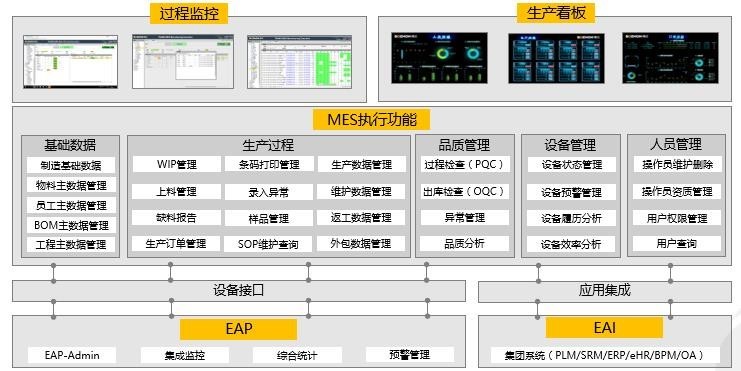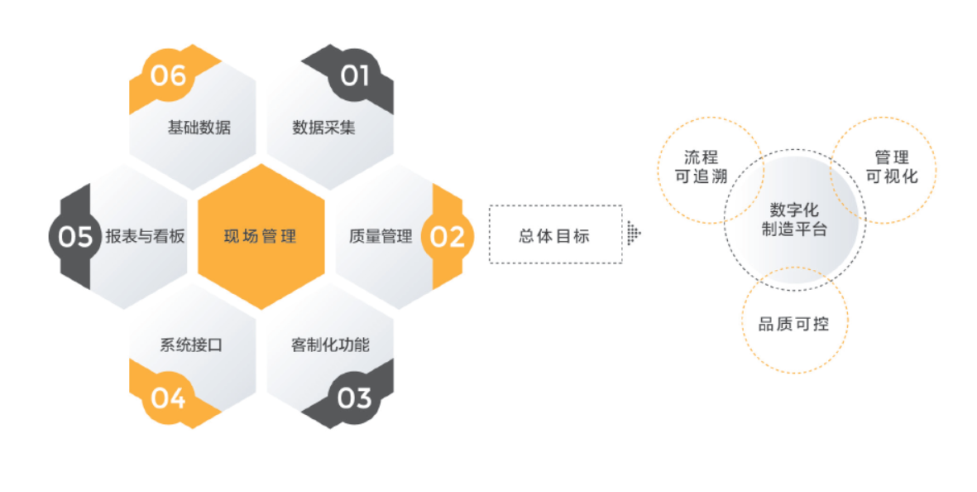Hongbao
Information Platform TSAMO
With 2.5 years of effort, based on the internationally advanced MOM concept, self-developed architecture, and successfully implemented in the machining center, the TSAMO (Total Solution for Advanced Manufacturing Operation) information platform, through the control of enterprise resources and processes in various links such as business sales, R&D design, production manufacturing, quality control, and after-sales service, combined with lean thinking, using Internet technology and data analysis technology, realizing the intelligent, digital, image-based, and hierarchical real-time management of enterprises.
Suitable for machining, injection molding, and stamping industries.
The TSAMO digital factory has not only been verified in the machining industry but is also widely applicable to discrete manufacturing industries, including injection molding and stamping. We have begun to cooperate with colleges and universities and scientific research institutions. New technologies such as big data analysis, cloud computing, and Internet of Things modules will be continuously applied to our platform. With the accumulation and upgrading of technology, we will soon realize equipment status prediction, capacity prediction, and advanced plan scheduling. Combining existing technologies, we will use the digital factory information platform to help upgrade the manufacturing industry in furniture, new energy, and consumer products!
Manufacturing Execution System (MES)
Main Functions of MES

Shopfloor Management
꙰ Standard Procedures —By using data interfaces with supporting systems such as PDM/CAPP, it retrieves product processing parameters, process paths, drawings, or E-SOPs and other engineering production data in real time. This standard production data is bound to the product itself, standardizing and guiding the actual production history of the product.
꙰ Process Traceability —Full process traceability of shopfloor production nodes. Through data acquisition at process nodes, a panoramic view of any product's production history can be presented, including special processes such as rework, repair, and outsourcing, achieving product archival data management.
꙰ Mistake-Proofing and Early Warning —Intelligent mistake-proofing and early warning for sensitive production nodes. Various mistake-proofing settings, such as process mistake-proofing, component mistake-proofing, and attachment mistake-proofing, ensure product quality.
꙰ Material Management —Material management kanban designed with lean thinking. It can share production line, warehouse, and preparation area material data in real time, implementing the PULL-type material pulling principle, greatly improving production line material preparation efficiency and avoiding production line stoppages due to material shortages.

꙰ Data acquisition is achieved through handheld scanners, wireless Bluetooth scanners, PDAs, tablets, equipment integration interfaces, and traditional equipment sensors. This forms a three-dimensional, comprehensive, and seamless data acquisition capability, providing the most basic guarantee for a panoramic view of production information.
꙰ Standard Procedures —By using data interfaces with supporting systems such as PDM/CAPP, it retrieves product processing parameters, process paths, drawings, or E-SOPs and other engineering production data in real time. This standard production data is bound to the product itself, standardizing and guiding the actual production history of the product.
꙰ Process Traceability —Full process traceability of shopfloor production nodes. Through data acquisition at process nodes, a panoramic view of any product's production history can be presented, including special processes such as rework, repair, and outsourcing, achieving product archival data management.
꙰ Mistake-Proofing and Early Warning —Intelligent mistake-proofing and early warning for sensitive production nodes. Various mistake-proofing settings, such as process mistake-proofing, component mistake-proofing, and attachment mistake-proofing, ensure product quality.
Quality Management
꙰ The quality analysis mechanism designed based on the TQM (Total Quality Management) system provides quality tracking services for the entire product process from production to delivery. Reports and kanbans generated using modern quality management methods such as SPC and Six Sigma can accurately and effectively analyze product quality.
Data Foundation
꙰ The MES system unifies the data specifications and information codes of other systems. It standardizes, normalizes, and unifies all factory production data, and provides reliable user permission management and process control for the maintenance and preservation of basic data, maximizing data security and accuracy.
Reports and Kanban
꙰ Results are presented to users and managers through visual graphics and data. All relevant required reports are automatically generated and can be customized according to customer needs and pushed to email, changing the traditional production management method of manual statistics and sending.

